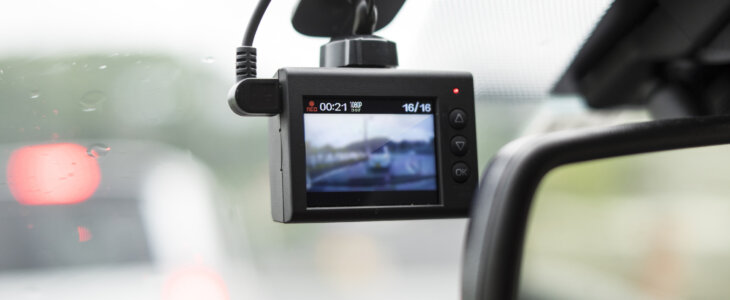Dash cameras, or dash cams, have become increasingly popular among drivers to record their journeys and capture what happens on the road. These cameras can be particularly useful in a car accident, offering real-time footage of the incident. But if you’re involved in a car accident, you may wonder: Is dash cam footage admissible in a car accident case? The short answer is generally yes, but there are some important details to understand about how and when this type of evidence can be used. Keep reading to learn when it can be used by the lawyers at The Payne Law Group.
What Is Dash Cam Footage?
A dash cam is a small, mounted camera that records video from the driver’s perspective. It is typically positioned on the dashboard or windshield of a vehicle. The camera continuously records the driver’s view of the road; some models even record audio or interior footage. Dash cams can capture the moments leading up to and during an accident, providing vital evidence when determining fault.
Is Dash Cam Footage Admissible in Court?
In most cases, dash cam footage is admissible in court as evidence, but it must meet certain legal criteria. Like any other evidence, the footage must be deemed relevant, reliable, and authentic to be presented in a car accident case.
- Relevance: For the footage to be admissible, it must be relevant to the case. This means the video needs to provide information that can help establish the facts of the accident, such as how it occurred, who was involved, and whether any traffic laws were violated.
- Reliability: The footage must be reliable, meaning it hasn’t been tampered with or altered in any way. The timestamp on the footage, the camera’s functionality, and the chain of custody (who had access to the video) are often scrutinized to ensure the video’s accuracy.
- Authenticity: To be used in court, the dash cam footage must be authenticated. This means the person who presents the video must be able to verify that the footage is genuine and has not been edited. Often, this will involve testimony from the owner of the dash cam or the individual responsible for maintaining the recording.
When Can Dash Cam Footage Be Used in a Car Accident Case?
Dash cam footage can be a powerful tool in car accident cases, whether the case is being settled through negotiations or going to trial. Here’s how dash cam footage can be helpful:
- Proving Fault: The primary use of dash cam footage is to help determine who was at fault in a car accident. If the footage clearly shows one driver running a red light, making an illegal turn, or driving recklessly, it can serve as strong evidence in assigning responsibility for the crash.
- Challenging Witness Testimonies: Witnesses to a car accident may have varying accounts of what happened, and their recollections may be influenced by stress, confusion, or limited visibility. Dash cam footage can provide an objective perspective that either supports or refutes these accounts, helping to clarify disputed facts.
- Supporting Insurance Claims: Dash cam footage can be particularly helpful when dealing with insurance companies. Insurance adjusters often rely on police reports, witness statements, and photos to assess fault. However, dash cam footage offers real-time evidence that can support your version of events and strengthen your compensation claim.
- Avoiding False Claims: Dash cams can also help prevent fraudulent claims. In some cases, drivers might attempt to stage accidents or exaggerate their injuries to seek a higher payout. If you have dash cam footage of the accident, it can quickly disprove any false allegations and protect you from liability.
Limitations of Dash Cam Footage
While dash cam footage can be valuable, it does have its limitations. The camera’s field of view is restricted to what’s in front of the vehicle, so if an accident occurs outside the camera’s range, the footage may not capture the full scope of the incident. Additionally, dash cams typically do not capture audio or events happening inside other vehicles, which may also be relevant in some cases.
Legal Considerations for Dash Cams
If you have dash cam footage of a car accident, it’s important to understand the legal implications of using it in a case.
- State Laws on Recording: Each state has different laws regarding the use of dash cams, especially when it comes to recording audio. In Texas, dash cam audio is legal as long as one party consents. That one person can be you, so if you are not present in the recording, this could pose an issue.
- Preserving Evidence: If dash cam footage is to be used as evidence, the footage must be properly preserved. Make sure that the recording is saved immediately after the accident and is not accidentally erased or overwritten. Providing a clear chain of custody for the footage can also help establish its authenticity in court.
- Sharing with Law Enforcement: After an accident, it’s a good idea to share your dash cam footage with law enforcement. Police officers can use the video to supplement their reports and determine fault. Additionally, having an official record of the footage can help validate its use in legal proceedings.
How The Payne Law Group Can Help
If you’ve been involved in a car accident and have dash cam footage that could help your case, it’s essential to work with an experienced attorney who understands how to leverage this type of evidence. At The Payne Law Group, we have extensive experience handling car accident cases and know how to use dash cam footage to build a strong claim effectively. Our team will help you navigate the legal process, ensuring that your rights are protected and you can secure compensation for your injuries and damages.
If you or a loved one has been injured in a car accident near Bryan and College Station, contact The Payne Law Group today to schedule a consultation. We’re here to help you understand your legal options and pursue justice for your losses.

